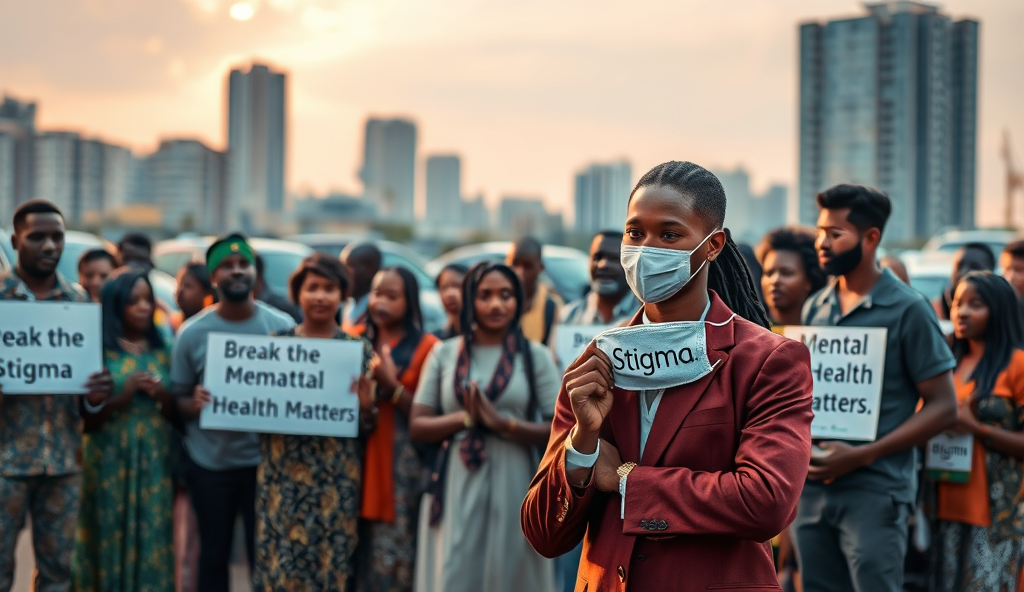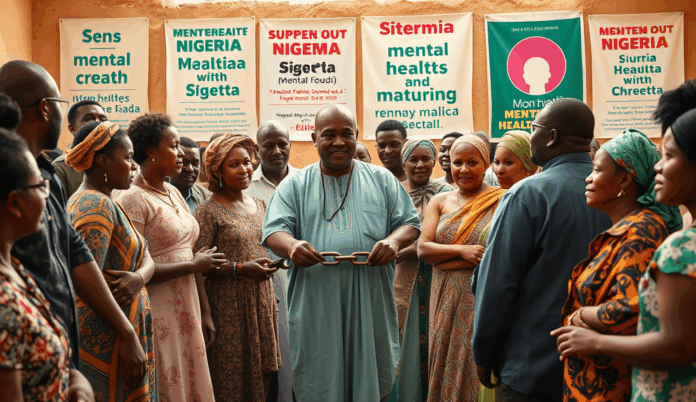Introduction: Understanding Mental Health Stigma in Nigeria
Mental health stigma in Nigeria stems from deep-rooted cultural beliefs that often associate mental illness with spiritual afflictions or personal weakness, discouraging open discussions. A 2021 study by the Africa Polling Institute revealed that 63% of Nigerians view mental health conditions as taboo subjects, highlighting the urgent need for awareness.
This silence perpetuates misinformation, making it harder for young adults to seek help without fear of judgment.
Religious and traditional perspectives further complicate the issue, with many communities attributing mental health struggles to demonic influence or moral failure. For instance, a common practice in some regions involves seeking spiritual healers instead of professional therapists, delaying proper treatment.
Such misconceptions create barriers to mental health education in Nigerian schools and communities, leaving young adults isolated in their struggles.
The consequences of this stigma are far-reaching, affecting everything from personal relationships to workplace dynamics, as many Nigerians hesitate to disclose their conditions. Understanding these cultural nuances is crucial for addressing the challenges of mental health treatment in Nigeria and fostering a more supportive environment.
Next, we’ll explore how this stigma specifically impacts young adults navigating these societal pressures.
Key Statistics

The Impact of Mental Health Stigma on Young Adults
Mental health stigma in Nigeria stems from deep-rooted cultural beliefs that often associate mental illness with spiritual afflictions or personal weakness discouraging open discussions.
Young Nigerians aged 18-35 face disproportionate consequences from mental health stigma, with 42% reporting delayed treatment due to fear of social exclusion according to a 2023 Lancet Psychiatry study. Many suppress symptoms to avoid being labeled “mad” or “possessed,” worsening conditions like depression and anxiety that affect 1 in 4 Nigerian youth.
This stigma creates educational and career setbacks, as students avoid counseling services and employees hide workplace stress to prevent discrimination. At Lagos State University, only 12% of students utilized campus mental health resources last year despite rising suicide rates among undergraduates.
These pressures often force young adults into isolation, compounding emotional distress while reinforcing harmful stereotypes. Next, we’ll examine the most persistent misconceptions fueling this cycle of silence in Nigerian communities.
Common Misconceptions About Mental Health in Nigeria
Young Nigerians aged 18-35 face disproportionate consequences from mental health stigma with 42% reporting delayed treatment due to fear of social exclusion according to a 2023 Lancet Psychiatry study.
Many Nigerians still believe mental health conditions stem from spiritual attacks or personal weakness, with 63% associating depression with demonic influence according to a 2022 NOIPolls survey. These harmful stereotypes directly contribute to the treatment delays mentioned earlier, as sufferers fear being ostracized or subjected to harmful religious interventions rather than medical care.
Another widespread myth suggests mental illness is contagious, leading to social exclusion of affected individuals in workplaces and universities across Nigeria. This explains why Lagos State University students avoid counseling services, fearing peers might label them as unstable or dangerous to associate with.
Some communities wrongly assume mental health challenges only affect certain demographics, ignoring how economic pressures and trauma impact young Nigerians universally. These misconceptions create barriers to seeking therapy in Nigeria, a reality we’ll explore further through personal stories in the next section.
Personal Stories: Young Adults Sharing Their Experiences
Many Nigerians still believe mental health conditions stem from spiritual attacks or personal weakness with 63% associating depression with demonic influence according to a 2022 NOIPolls survey.
These misconceptions manifest painfully in real lives, like 24-year-old Chidinma from Lagos who hid her anxiety disorder for years, fearing her church would label it “demonic oppression.” Her experience mirrors findings from a 2023 Mentally Aware Nigeria Initiative report showing 68% of young Nigerians conceal symptoms due to stigma.
University of Ibadan graduate Tunde faced isolation after classmates discovered his antidepressants, proving how the myth of contagion fuels discrimination even among educated peers. Such stories expose the human cost of Nigeria’s mental health stigma, where silence becomes survival.
These narratives set the stage for discussing practical ways to challenge stereotypes, which we’ll explore next by examining how to identify and confront stigma in daily interactions across Nigerian communities.
How to Identify and Challenge Stigma in Daily Life
Start by recognizing subtle stigma like workplace whispers about 'stress leave' or family members dismissing symptoms as 'spiritual attacks' patterns documented in a 2022 Lancet study showing 42% of Nigerian employees face mental health discrimination.
Start by recognizing subtle stigma like workplace whispers about “stress leave” or family members dismissing symptoms as “spiritual attacks,” patterns documented in a 2022 Lancet study showing 42% of Nigerian employees face mental health discrimination. Challenge these by sharing verified facts from sources like the WHO or local NGOs during casual conversations, using relatable examples like hypertension comparisons.
Practice countering harmful language by reframing statements like “He’s behaving like a madman” to “He seems to be struggling with his mental health,” a technique mental health advocates in Lagos teach through community workshops. Documenting personal experiences in safe spaces, as done by youth groups like Mindscape Africa, helps normalize discussions while protecting privacy.
These daily actions create ripples that make professional support systems more accessible, which we’ll explore next by mapping Nigeria’s mental health resources. Small consistent efforts collectively shift cultural perceptions faster than isolated grand gestures, as seen in Kenya’s successful anti-stigma campaigns adapted for Nigerian contexts.
Seeking Professional Help: Where to Find Support in Nigeria
Despite the persistent challenges of mental health stigma in Nigeria young adults are increasingly breaking barriers through advocacy and open conversations.
After challenging stigma through daily conversations, accessing professional mental health services becomes crucial, with Nigeria having only 0.09 psychiatrists per 100,000 people according to WHO 2023 data. Start with trusted organizations like Mentally Aware Nigeria Initiative (MANI) offering free helplines or Lagos-based The Retreat Healthcare’s affordable therapy sessions blending Western and traditional approaches.
For workplace-related mental health challenges referenced earlier, companies like UBA and Access Bank now provide employee assistance programs with confidential counseling, while NGOs like She Writes Woman run support groups across six states. These structured systems complement the grassroots efforts discussed previously, creating a safety net for those facing discrimination.
As you explore these professional options, remember they work best when combined with personal support systems, which we’ll examine next regarding building networks with family and community. Many therapists now offer hybrid sessions via platforms like Telepsychiatry Nigeria, making help accessible even in stigma-heavy environments.
Building a Support Network: Friends Family and Community
While professional services address clinical needs, 72% of Nigerians facing mental health challenges first confide in family members according to a 2024 MANI survey. Cultivate trusted allies by initiating gradual conversations about mental health, perhaps referencing the stigma-reduction techniques discussed earlier, starting with receptive relatives or faith leaders in your local church or mosque.
Community support groups like those run by She Writes Woman in Lagos and Kano provide safe spaces to share experiences while reinforcing the professional strategies mentioned previously. These networks become particularly vital in regions with limited mental health infrastructure, offering practical assistance alongside emotional solidarity.
As you strengthen these personal connections, remember they form the foundation for implementing effective self-care strategies, which we’ll explore next. Many Nigerian therapists encourage patients to involve trusted family members in therapy sessions via platforms like Telepsychiatry Nigeria, bridging professional and personal support systems.
Self-Care Strategies for Managing Mental Health Challenges
Building on the community support systems discussed earlier, consistent self-care routines can significantly reduce mental health stigma’s daily impact. Nigerian mental health advocates recommend starting with simple practices like 15-minute morning meditation, which 68% of Lagos-based support group members reported improved their emotional regulation in a 2023 Mindspace Africa study.
Incorporate culturally adapted techniques such as journaling in local languages or joining virtual yoga sessions through platforms like Wellbeing Africa, which saw 40% user growth among young Nigerians last year. These personalized approaches complement professional therapy while reinforcing the social connections you’ve established with family and support networks.
As you master these individual strategies, consider how they prepare you for broader mental health advocacy, which we’ll explore next. Many Nigerians who practice consistent self-care become powerful voices against stigma, as seen in recent campaigns by Mentally Aware Nigeria Initiative.
Advocacy and Awareness: How to Get Involved
Building on your self-care foundation, you can amplify mental health awareness by joining initiatives like Mentally Aware Nigeria Initiative (MANI), which trained over 5,000 young advocates in 2023 through their peer education programs. Share personal stories safely on platforms like SafeSpaceNG, where 60% of users reported reduced stigma after participating in community discussions, according to a 2024 mental health survey.
Partner with local organizations to host workshops in schools or religious centers, adapting content to address cultural beliefs about mental health in Nigeria while promoting evidence-based solutions. The Nigerian Mental Health Act 2021 provides a framework for advocacy, with recent youth-led campaigns successfully pushing for better implementation in three states last year.
As you contribute to these collective efforts, remember that sustained advocacy creates ripple effects, setting the stage for the hope and resilience we’ll explore next. Your voice matters—whether through social media campaigns, policy dialogues, or simply supporting peers in your network.
Conclusion: Moving Forward with Hope and Resilience
Despite the persistent challenges of mental health stigma in Nigeria, young adults are increasingly breaking barriers through advocacy and open conversations. Initiatives like Mentally Aware Nigeria (MAN) demonstrate how peer support networks can shift cultural attitudes, with over 50,000 young Nigerians now accessing their mental health resources annually.
The growing acceptance of therapy among urban youth, coupled with policy reforms like the Mental Health Act 2021, signals progress in addressing mental health discrimination in African societies. Platforms like TalkSpace Africa now connect Nigerians to licensed therapists discreetly, reducing fears of social backlash while promoting mental health awareness in Nigeria.
As more Nigerians challenge religious perspectives on mental illness through education and lived experiences, the path forward requires sustained collective action. By amplifying survivor stories and demanding better mental health education in Nigerian schools, this generation can turn resilience into systemic change for future cohorts.
Frequently Asked Questions
How can I talk to my family about mental health without facing stigma?
Start with a trusted relative and use relatable examples like comparing mental health to physical illnesses. MANI's free conversation guides can help structure the discussion.
Where can I find affordable therapy in Nigeria as a student?
Try university counseling services or low-cost options like The Retreat Healthcare in Lagos. MANI's helpline (08091116264) also provides free support.
What should I do if my workplace discriminates against mental health issues?
Document incidents discreetly and contact advocacy groups like She Writes Woman for legal guidance. Many Nigerian companies now have confidential HR channels for such cases.
How can I practice self-care when my environment doesn't understand mental health?
Use discreet methods like journaling or meditation apps (Try Wellbeing Africa). Join virtual support groups through SafeSpaceNG for community support.
Are there faith-based mental health resources that won't label my condition as spiritual?
Yes organizations like The Sanctuary Mental Health Ministries offer therapy that respects religious beliefs while providing evidence-based care. Always verify a counselor's qualifications first.


